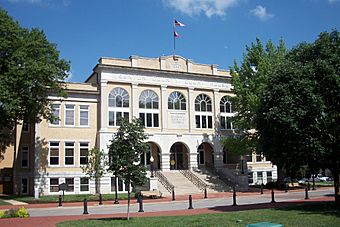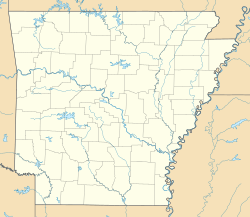Benton County Courthouse (Arkansas) facts for kids
The Benton County Courthouse is an important building in Bentonville, Arkansas. It's where the local government for Benton County does its work. Built in 1928, this grand building was added to the National Register of Historic Places in 1988. It was designed by Albert O. Clark in a style called Classic Revival. You can find it on the east side of the Bentonville Town Square.
Quick facts for kids |
|
|
Benton County Courthouse
|
|

The Benton County Courthouse anchors the east side of the Bentonville square
|
|
| Location | 106 SE A Street, Bentonville, Arkansas |
|---|---|
| Area | less than one acre |
| Built | 1928 |
| Architect | Albert O. Clark |
| Architectural style | Classical Revival |
| MPS | Benton County MRA |
| NRHP reference No. | 87002340 |
| Added to NRHP | January 28, 1988 |
A Look Back: Courthouse History
The architect who designed the courthouse was Albert O. Clark. He moved to Rogers, Arkansas from St. Louis, Missouri in 1904. Clark was known for using the Classic Revival style in his designs. He built other important buildings in the area.
After seeing his good work, Bentonville hired Clark. He designed several buildings, including the Benton County Jail. He also designed this courthouse. His new building replaced an older one built in 1874. That older building was in the Italianate style. The very first courthouse in Benton was a simple log building. It was built way back in 1837.
Building Style: Architecture
"Sovereignty rests with the people"
The Benton County Courthouse is built in the Classic Revival style. This style is also known as Neoclassical. It means the building looks like ancient Greek or Roman temples. A key feature is its perfectly balanced front, called a façade. The main entrance is right in the middle.
The building also has special decorative stones. These are called keystones. They are a common part of Classic Revival buildings. The third floor used to have an open balcony. Later, this balcony was closed in. This was done to help control the temperature inside. Today, the windows on the enclosed third floor have round tops. This change made them look more like the Romanesque Revival style.



